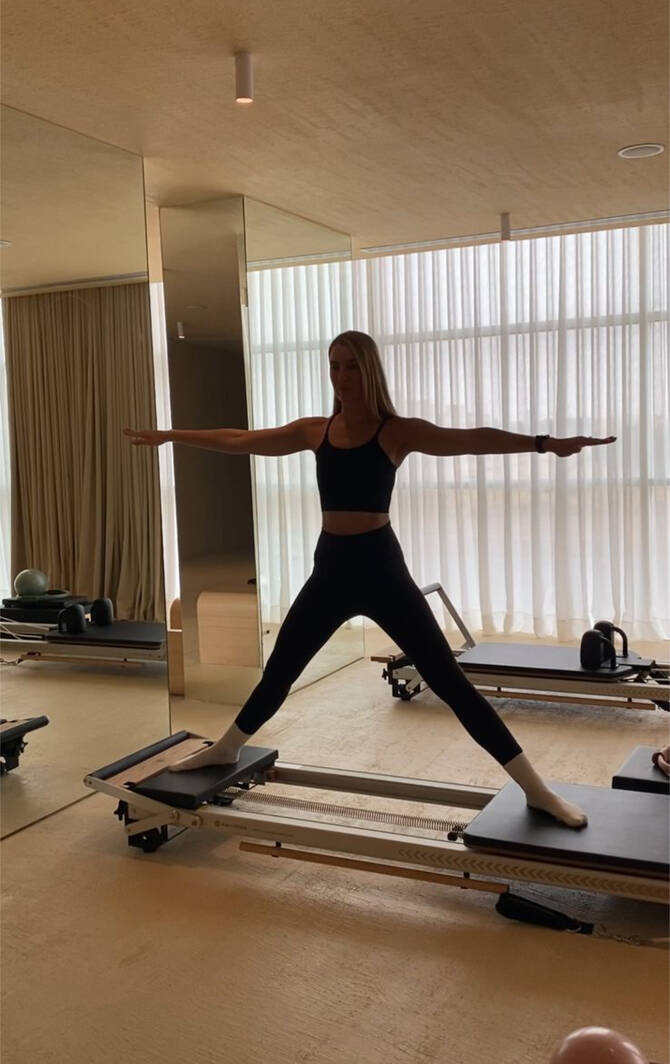RIYADH: A number of female-only wellness spaces in Riyadh are aiming to provide empowering communities for women, driven by the desire for privacy and comfort.
Locations like gyms, pools and even some theme parks have created safe spaces exclusively for women on designated days.
This allows women to dress freely and engage in activities that foster a sense of community.

"Yoga by Sunset", a serene environment dedicated solely to women. (Supplied)
One such place is Sunsets Yoga, a serene studio environment dedicated solely to women.
It offers an array of classes and programs focused on health and wellness and also has an entertainment center where women can unwind and connect.
“Sunsets Yoga was born out of my passion for yoga and my deep desire to help people,” owner Wateen Al-Tuwaijri told Arab News.
Since moving to Saudi I have really noticed the benefits of going to a female-friendly Pilates studio. Not only is it comfortable but I feel confident in my own skin and body. The highlight for me has to be the networking. I have met some pretty incredible women who are not only inspiring but are like-minded.
Emma Shirley
“I opened this space because I believe in the transformative power of yoga — not just for the body, but for the mind and soul as well.
“My goal for Sunsets Yoga is to create a welcoming, peaceful environment where individuals can escape the stresses of daily life, reconnect with themselves and grow both physically and mentally.”

“Yoga is a universal tool for balance and I wanted to ensure that women here have access to a space where they can focus on their health and well-being without any barriers. (Supplied)
Al-Tuwaijri said it was “especially important” to have places in Riyadh that cater exclusively to women.
“Yoga is a universal tool for balance and I wanted to ensure that women here have access to a space where they can focus on their health and well-being without any barriers.
“It’s about supporting their journey of self-discovery and personal growth in a place where they can feel free, strong and inspired.”

The studio offered a range of regular, pre/post-natal and customized private training sessions. (Supplied)
Al-Tuwaijri said she wanted to build “a community that supports, encourages and nurtures” people.
Another prominent female-only space is the reformer Pilates studio Bdn in Al-Rayyan District.
“I’ve been practicing reformer Pilates for over 15 years now and swear by it,” owner Najd Al-Hatlani said.

Another prominent female-only space is "Bdn", a Pilates studio designed specifically for women. (Supplied)
“It has given me impeccable self-awareness regarding my body and how the smallest muscles move to support the larger ones … it has completely changed my perspective regarding all workouts.
She said she opened the studio to serve an untapped market in the east of Riyadh.
“Female-oriented spaces have always been part of our cultural heritage and experience. I think it’s important to continue to offer these safe haven spaces for women in order to maximize their well-being.
“As kind as many people want to be, we as women have shared far too many similar experiences through life which makes it comforting to be in the same room as that unspoken supportive energy.”
The studio offered a range of regular, pre/post-natal and customized private training sessions, Al-Hatlani said.
Emma Shirley, an Australia living in Riyadh, is a regular at Bdn.
“Since moving to Saudi I have really noticed the benefits of going to a female-friendly Pilates studio. My go-to Pilates studio in Riyadh is Bdn. I have been going there for a few months.
“Not only is it comfortable but I feel confident in my own skin and body. The highlight for me has to be the networking. I have met some pretty incredible women who are not only inspiring but are like-minded.”




































